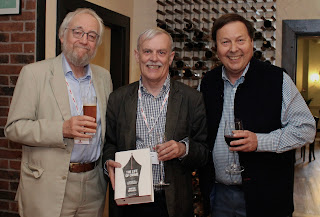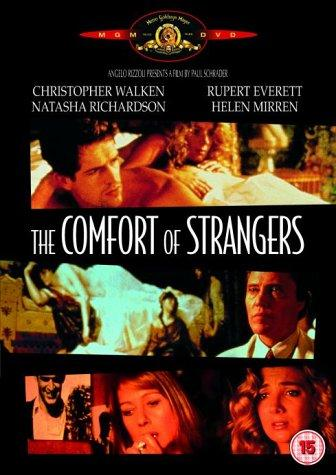I'm just back from Bristol after yet another excellent CrimeFest. Sadly, it's to be the very last one, although there was an announcement at the banquet by Barry Ryan which suggested that this great festival may re-emerge in some form in future. Fingers crossed! But in the meantime, warmest congratulations to Adrian Muller and Donna Moore for everything they have achieved. It really has been a blast. I've attended since the start, and only missed one, which clashed with a lecture trip on the Queen Mary: there had to be a compelling reason to miss out! So this post is a blend of reminiscences and photos about the weekend, and CrimeFests past. Starting with a proud moment above as part of the Diamond Dagger panel and with my fellow ex-chairs Maxim Jakubowski and Vaseem Khan below.

I've got so many happy memories from CrimeFest over the years, far too many to mention here. Interviewing Peter Lovesey was one highlight, being interviewed by Donna, together with Robert Goddard, when I was guest of honour three years ago, was another. Having a drink in the bar with the film director Mike Hodges and discussing Get Carter. Meeting my agent James Wills for the first time. Parties with publishers. Launching The Life of Crime. Lunches and dinners with friends such as Ayo Onatade, Michael Ridpath, Ann Cleeves, and John Curran. Presenting the Diamond Dagger to Peter James and chatting with Martina Cole.



And on a perhaps self-indulgent note, I've been lucky enough to pick up quite a few items of lovely Bristol Blue Glass. Winning the CrimeFest H.R.F. Keating award three times, the first presented by Harry Keating's widow Sheila. Being presented with the inaugural CWA Margery Allingham short story award. Two Criminal Mastermind wins. Quite a few pub quiz wins, too. Plus three eDunnit award shortlistings. But of course, what is most importantly of all is the friends I've met and made. All of them have contributed to this being a must-attend event in my calendar.
I co-edited with Adrian the anthology Ten Year Stretch, celebrating the festival's first decade, in which my daughter Catherine translated a story by Maj Sjowall, whom I was delighted to meet, and I was also delighted to contribute a new story, 'The Butler', to the new anthology, brilliantly titled Leaving the Scene.
This year began on Thursday with my moderating a panel about Authors Remembered, with David Whittle, Katherine Hall Page (an MWA Grand Master, lovely to spend time with her and her husband Alan again; we'd not seen each other for ages), Christine Poulson, and Dolores Gordon-Smith. (My author, by the way, was Martin Russell.) A convivial dinner with Simon Dinsdale, David Brawn, Sarah Dunnakey and others was followed by Peter Guttridge's final pub quiz. And we did manage to snaffle the prize. Then a good chat in the bar with Peter and Mike Stotter.
On Friday I did some sightseeing, but also had lunch with Bryan J. Mason and Caro Ramsay and her husband and also bumped into more CrimeFest regulars such as Sue Lord and Zoe Sharp. There was a fun book signing for Leaving the Scene and a chance to catch up with Vas Khan and Maxim Jakubowski. Then James Wills and I recreated our original dinner encounter, recalling how I pitched to him the idea of The Golden Age of Murder...A great evening.

Saturday was busy and I had the huge pleasure of meeting Mark Gatiss for the first time before the Diamond Dagger panel. This was a wonderful standing-room-only occasion moderated by Simon Brett and including Lee Child, Lindsay Davis, and me. We also had the chance to pay tribute to the late Peter Lovesey, and also to feature John Harvey, who was due to attend but unable to make it. Then I recorded a podcast, about which more in the future, and there was the Playing Dead anthology panel with Simon, Ruth Dudley Edwards, Alison Joseph, Len Tyler, and Kate Ellis. The banquet was as good as ever - with Cathy Ace bringing events to an end with great style (as the photo shows, I'd had a chance to catch up with her and her husband in the sunshine earlier!). There was a chance to chat with people like Jeff Siger and Ayo Onatade and to meet Sara Lodge, whose book on Victorian female detectives I discussed here last November.

Another panel to kick off Sunday morning, about history-mysteries, with Helena Dixon, Luke McCallin, Sarah Williams, and Dolores, was a lot of fun. But then, because of the nightmare of train cancellations, I had to say my goodbyes. Yet the journey back was great, because luckily for me, Dave Penny offered to give me a lift home and I was glad to get to know him much better - a very interesting companion.
All good things come to an end, but I must say that CrimeFest has been a very good thing. And I'm grateful to everyone who has made it so special to me for so long.
.jpg)


































.JPEG)

